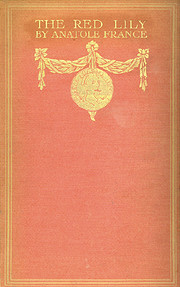

Pulse en una miniatura para ir a Google Books.
|
Cargando... La azucena roja (1894)por Anatole France
 Ninguno Actualmente no hay Conversaciones sobre este libro.  The Red Lily is an old-fashioned French novel about the aristocracy (or in my opinion the lazy rich). They spend their days visiting: each other, museums, churches, popular natural sites, and shops. They also philosophize, gossip and rendezvous with their lovers. And many times somebody gets hurt. Anatole France uses dialog to describe the superficiality, the hypocrisy, the double-standard toward women, the awkward moments of this social group to make us see them clearly. I didn't understand the political components as much as I would have liked but then again politics have never been my strong suit. May I say this was a good read despite my NOT LIKING most of the characters? That speaks, of course, to the author's excellence. sin reseñas | añadir una reseña
Pertenece a las series editorialesBerömd litteratur (Baltiska förlaget) Colección Folio (2431) Gallimard, Folio Classique (2431)
Anatole France (1844-1924), born Francois-Anatole Thibault, was a French author. He studied at the College Stanislas and after graduation he helped his father by working at his bookstore. After several years he secured the position of a cataloguer at Bacheline- Deflorenne and at Lemerre, and in 1876 he was appointed a librarian for the French Senate. He became known after the publication of The Crime of Sylvestre Bonnard (1881). Along with Emile Zola, he became involved in the Alfred Dreyfus affair. He signed Zolas manifesto, publicly condemning the indictment of treason against Dreyfus, a Jewish army captain, who was being scapegoated to protect corrupt officials in the army. In 1901, France wrote about the affair in his book Monsieur Bergeret. He was elected to the French Academy in 1896 and was awarded the Nobel Prize for Literature in 1921. His later works include The Procurator of Judea (1902), Penguin Island (1908) and The Revolt of the Angels (1914). No se han encontrado descripciones de biblioteca. |
Debates activosNingunoCubiertas populares
 Google Books — Cargando... Google Books — Cargando...GénerosSistema Decimal Melvil (DDC)843.8Literature French French fiction Later 19th century 1848–1900Clasificación de la Biblioteca del CongresoValoraciónPromedio: (2.88) (2.88)
¿Eres tú?Conviértete en un Autor de LibraryThing. |
||||||||||||||||||||||||||||||||||||||||||||||||||||||||||||||||||||||||||||||||||||||||||||||||||||||||||||||||||||||||||